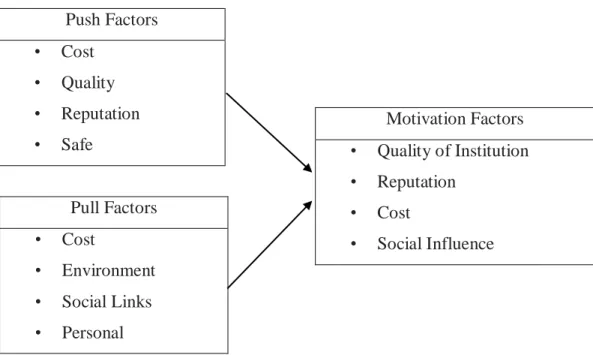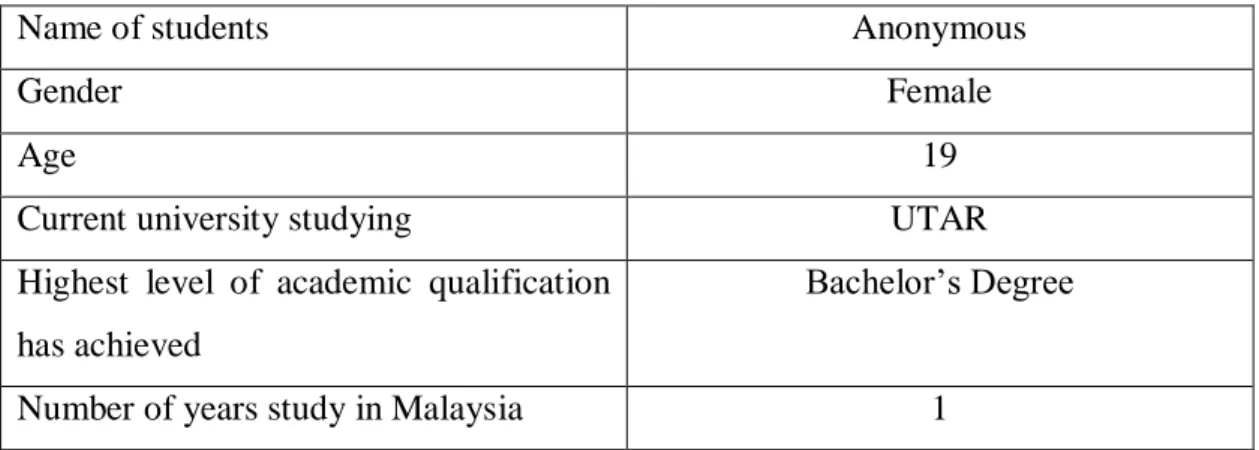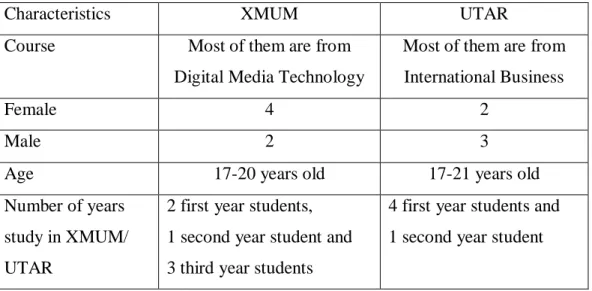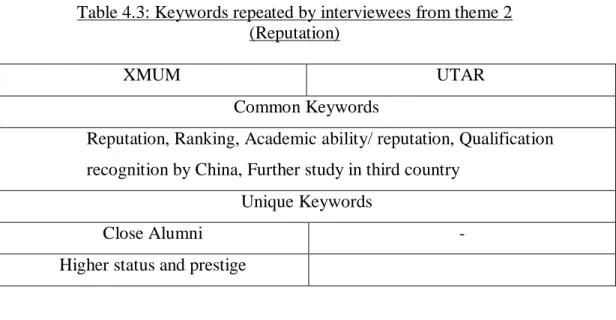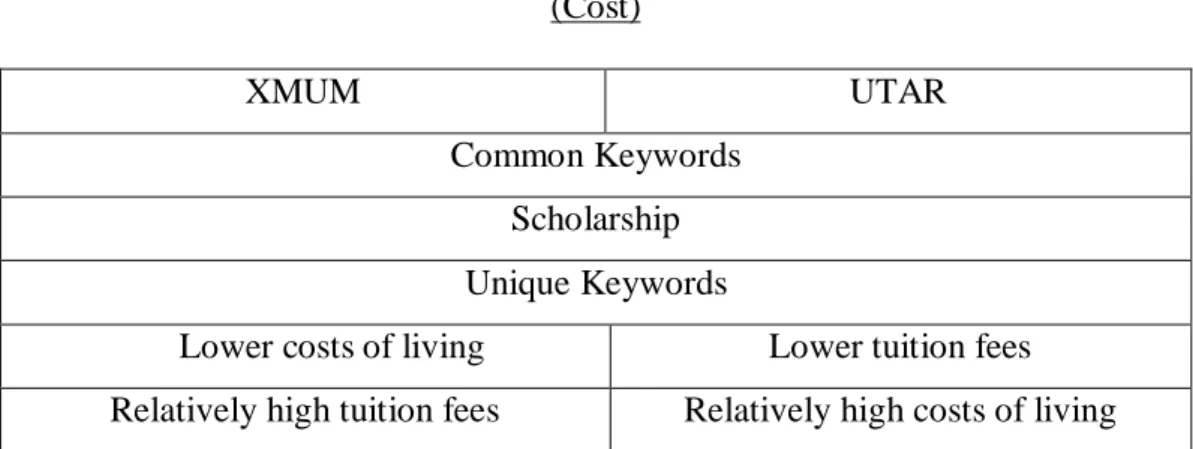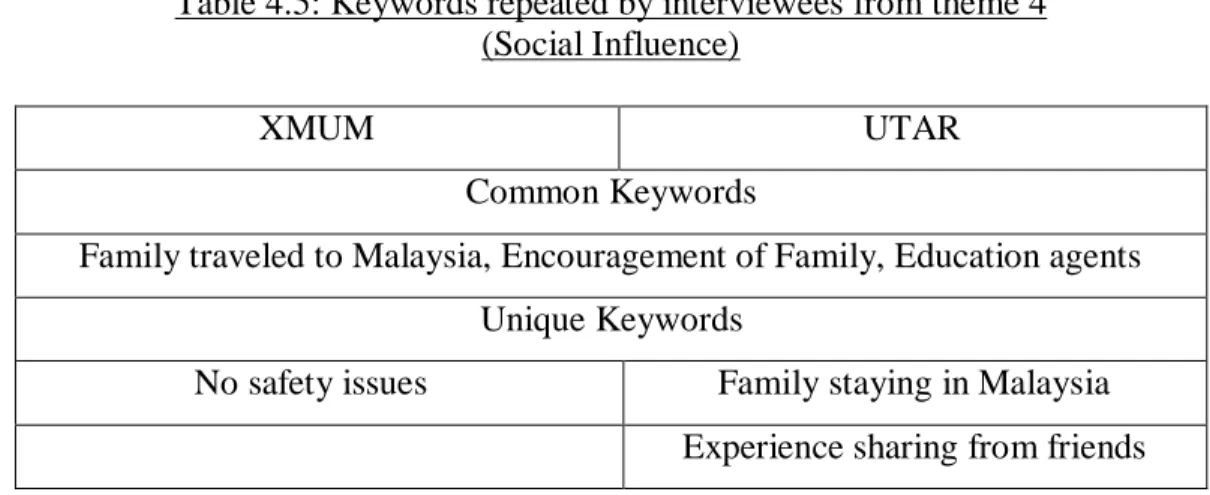No part of this paper may be reproduced, stored in a retrieval system, or transmitted in any form or by any means, graphic, electronic, mechanical, photocopying, recording, scanning, or otherwise, without the prior consent of the authors. First of all, I would like to express my utmost gratitude to some respected parties for helping to complete this last year's project. Therefore, I would like to take this opportunity to express my sincere gratitude to all of them.
Last but not least, I would like to thank all the interviewees of this study for their willingness to participate in the interview session to complete the Final Year Project. The purpose of this study is to investigate the motivational factors that influence Sino-Chinese students' decision to study in Malaysia (higher education) and to understand the similarities and differences between the Sino-Chinese students' motivational factors to study at local private university and international branch university in Malaysia. The limitations of this study are brief description given by interviewees, limited literature and limited view from social science background students.
INTRODUCTION …
- Background of Study
- Research Problems
- Research Objective
- Research Question
- Research Scope
- Research Significance
- Chapter Layout
- Conclusion
Indeed Asia is probably the open road to attract Chinese-Chinese students to study in Malaysia. The purpose of this study is to understand the attraction factors of China-China students coming to Malaysia to study in higher education especially in private universities. To investigate the motivational factors influencing China-China students' decision to study in Malaysia (higher education).
To understand the similarities and differences between the motivational factors of Sino-Chinese students to study at the local private university and the international branch university in Malaysia. What are the similarities and differences between the factors influencing China-Chinese students' decision to study at the local private university and the international branch university in Malaysia. The study will examine the motivational factors of Chinese-Chinese students and the choice to study for higher education in Malaysia.
LITERATURE REVIEW
- Malaysia Higher Education
- Education and Mobility of Students
- Conceptual/ Theoretical Framework
- Motivation Factors that will Influence the China-
- Reputation…
- Costs
- Social Influences
Studying abroad is also one of the benefits of globalization, the visa application process in a country will influence foreign students to choose the destination to study. The English-speaking environment is also established as one of the factors that foreign students choose Malaysia as a study destination in Ahmad's research. As a result in Smith (2016), the common language was studied as one of the most important factors in the decision to study in the United States.
There are several previous studies related to the topic of international students' motivational factors for choosing a higher education institution in a foreign country. The purpose of the study is to identify the reasons why the Indian international students choose to study in Singapore instead of Australia. Sweden shows one of the places that brings a large number of Sino-Chinese students.
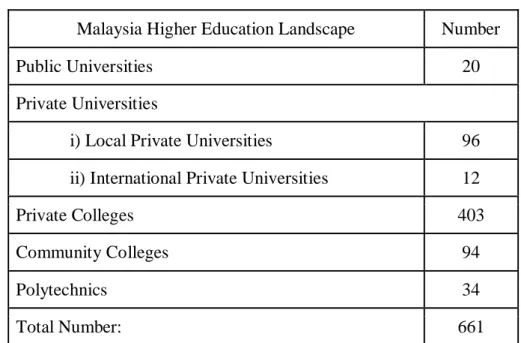
METHODOLOGY
- Research Design
- Sampling Design
- Target Population
- Sampling Frame and Location
- Sampling Technique
- Sampling Size
- Data Collection Methods
- Primary Data
- Secondary Data
- Questionnaire and Selecting the Interviewees
The sampling element is the only unit of the target population chosen in the sampling process, China Chinese students currently studying at the University of Xiamen, Malaysia and Universiti Tunku Abdul Rahman Sungai Long Campus were the sampling element in this study. The second step in the sampling process is to determine the sampling frame and location. The sampling frame is a list of all elements in the population from which the sample is drawn (Stevens et al, 2012).
There is no sampling frame in this study because the sampling method used is snowball and convenience, which is known as non-probability sampling. According to Vinal (2017), since the qualitative methods aim is to observe for meaning to understand the how and why behind things, the wealth of data is more focused on the in-depth understanding instead of the representativeness that the quantitative methods in research emphasized. Primary data are the first-hand sources of raw information obtained by the researchers for the research purpose (Sekaran and Bougie, 2009).
Primary data information is reliable and accurate because it is not mixed with other unrelated topics. Although it may consume more time and high travel costs compared to other instruments, the in-depth interview allows the researcher to gain some advantages, such as social cues (voice, intonation, body language) that can give the researcher a lot of additional information, more spontaneous response, because there is no time lag between the question and the answer, it can be recorded on tape with the permission of the interviewee, which makes the report more accurate and easier than other interview methods. Secondary data is information obtained from existing sources of others (Sekaran and Bougie, 2009).
They are easier to collect compared to primary data. One of the reasons why researchers would want to use secondary data is to play a role in conceptual understanding of the research topic by reviewing related topic journals or research done by others. Reliability of data may be based on the collectors, sources, appropriate collection methods and year of production of the data. The subject, scope and nature of the data should be similar or identical to the project; otherwise, they are not suitable for reference.
The adequacy of the data is determined by the purpose of the data, it is considered deficient if there is a major difference from the project.
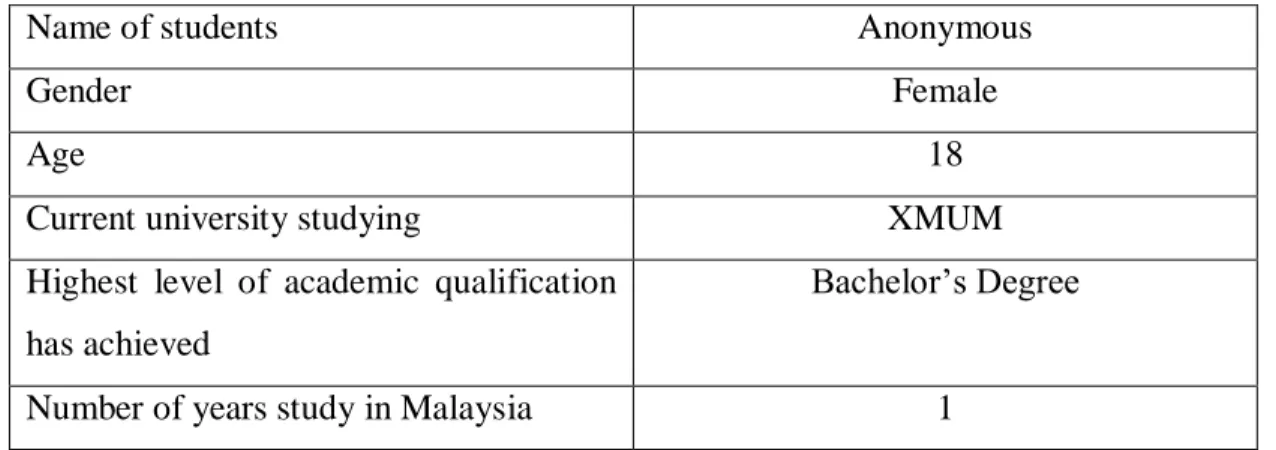
DATA ANALYSIS
Introduction
Demographics of the Interviewees
Research Findings
- Theme 1: Quality of Institution
- Theme 2: Reputation
- Theme 3: Costs
- Theme 4: Social Influence
- Extra Comments From Interviewees
Most interviewees do look at the research output of the teachers and also at the academic reputation of the teachers. Some interviewees emphasized that teachers' ability to manage a classroom is more important than their academic reputation. However, one interviewee was of the opinion that the importance of the reputation of the program will override the reputation of an institution.
All interviewees deny that studying in Malaysia will give them a higher status or prestige. In XMUM, most of the interviewees spend about RM1000 to RM1500 in Malaysia each month, they pointed out that the expenditure in Malaysia is estimated to be RM300 - RM500 more than in China. One of the interviewees concluded that his expenses may be higher in China than in Malaysia because the cost of living will also be different in different states in China.
Some interviewees mentioned that food prices in a Chinese university are lower than in Malaysia because they have a dedicated canteen to cater to the university community. Most of the interviewees were influenced by family and opinion leaders to come to XMUM, but not by their friends. One of the interviewees has relatives living in Malaysia, and the mother of the other interviewee had previously traveled to Malaysia and encouraged her to study here.
All interviewees' parents agreed or support them to study in Malaysia, but worried about their safety problems in Malaysia. In the study of Smith (2016) and Lee & Tan (1984), they mentioned that common language is one of the essential elements that motivates foreign students to study in a foreign country. One of the interviewees mentioned that if she can find a job in Malaysia, she will stay in Malaysia because of the wonderful environment.
Some of the interviewees believe that the climate in Malaysia will be an additional advantage motivating them to come to Malaysia because the climate here is pleasant, feels like summer all year round.
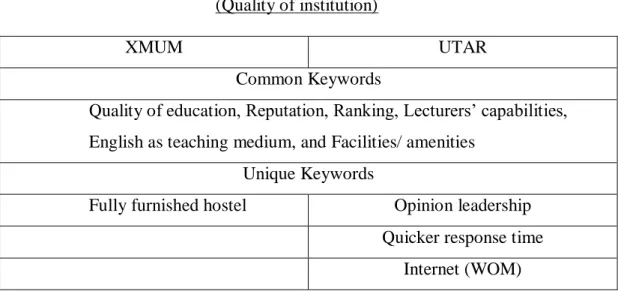
DISCUSSION, CONCLUSION AND
Discussion of Findings
Kamaruddin & Baharun (2010), the study states that reducing the cost of studying abroad is crucial when choosing a study destination. This is the reason why most of them want to improve their English skills in Malaysia because the cost here is relatively low with an English medium of instruction compared to universities in third countries mentioned in the research by Ahmad & Buchanan (2017). China-Chinese students can go for a professional private organization, but parents, close relationship and opinion leadership will play a role in choosing a study destination.
Based on the study of Dauber (2013), the decision to come overseas to study in international branch campus or local university is made by parents instead of students while the interview session in Wilkins & Huisman (2011), mentioned that China-Chinese students will only receive advice but make their own choice. However, through the interview in this study with two universities, the interviewees insist that they made the decision alone or together with the advice or discussion with the parent. On top of these 4 themes, the opportunity for multicultural and multilingual study environment can stimulate their thinking perspective to a lesser extent and therefore improve their job opportunities worldwide if they choose to work in a multinational company.
Malaysia's favorable learning environment and multicultural experiences could help them be more flexible in the globalization of business. Nowadays, globalization is a trend regardless of workplace or business perspective, so if Chinese-Chinese students can be exposed to the diversity in Malaysia, they can easily enter a multinational company without culture shock or not connecting with a special culture. Therefore, studying in Malaysia can be a good experience or enhance their study experience in Malaysia.
Implications of the Study
Limitations of the Study
Recommendations for Future Research
Conclusion
Would you still choose to study in Malaysia if the qualification is not recognized in your home country but internationally. Are there any scholarship, sponsorship or financial aid opportunities available for you to study in Malaysia. Which of the following influences you when you made your decision to study in Malaysia.
Did you choose to study in Malaysia because it is relatively easy to communicate using Mandarin? I have done research on qualified university recognition in China before choosing to study here. Would you still choose to study in Malaysia if the qualification is not recognized in your country but internationally.
Yes, one third of the lecturers at Xiamen University in China who come to XMUM motivate me to come and study her.
Interview China-Chinese student in UTAR
Interview China-Chinese student in UTAR
Questionnaire
Interview Response
